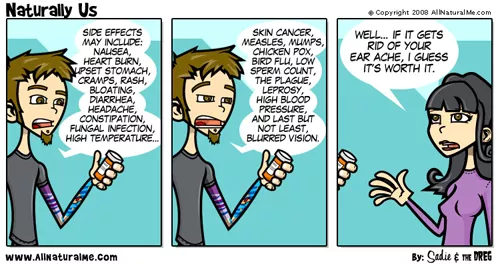It’s the end of your day and you’re sitting down watching your favorite program which is routinely interrupted by a long, bothersome stream of commercials — unhealthy snack foods and sugary beverages followed by prescription drug commercials telling you to “ask your doctor about _____”.
After being bombarded with pharmaceutical ads for so long, it’s become almost comical as you listen to the ailments the drug supposedly helps being followed up by a long, grizzly list of side-effects that seem much worse by comparison. Miracle drugs for blood pressure, erectile dysfunction, allergies, insomnia… we’ve heard them all.
What’s the trade-off for getting rid of allergies these days? Side effects include: irritability, loss of sleep, sore throat, stomach pain, anxiety, aggression, depression, obsessive behavior, panic attacks, swelling… wait a minute, swelling?! So, in other words, you’ll be a sleep deprived, mood swinging, rage-aholic with swelling who-knows-where, but at least your allergies won’t be bothering you.
On a much more serious note, these side effects often encompass much more detrimental consequences, few of which make it onto the label let alone out of the pharmacist’s mouth as they walk you through the mandatory instructory drug spiel.
For brevity’s sake, let’s focus on a very crucial mineral whose loss could be potentially fatal if not severely life altering. Magnesium’s role in human biology is so significant that a deficiency can lead to anything from depression, anxiety, insomnia, eczema, and headaches, to more serious things like diabetes, osteoporosis, Alzheimer’s and heart failure. Although many studies still debate the chicken-or-the-egg scenario, claiming effect rather than affect, the issue still remains that a substantial amount of the ailments that would benefit from magnesium intake, are in actuality being treated with drugs that deplete magnesium and ultimately exacerbate the underlying problem.


The reality is that the majority of medical doctors have no training in nutrition whatsoever, since it’s not an educational requirement (shocking, right?). Because of this, many of them fail to see the correlation between disease and nutrient intake (or lack thereof). If you’ve ever had the misfortune to eat hospital food, you’re probably familiar with this major oversight.
This is about the time we can thank our lucky stars for the internet, and the ability to research medications and their side effects on our own. But the real question is — should we have to? And at what point do we trade the painful side effects of a makeshift, superficial solution, for the overall well-being provided by nutrients that are biological necessities?
This is just one more reason to make sure that you are eating healthy, exercising regularly, supplementing accordingly and, of course, making sure that you are getting adequate magnesium!

